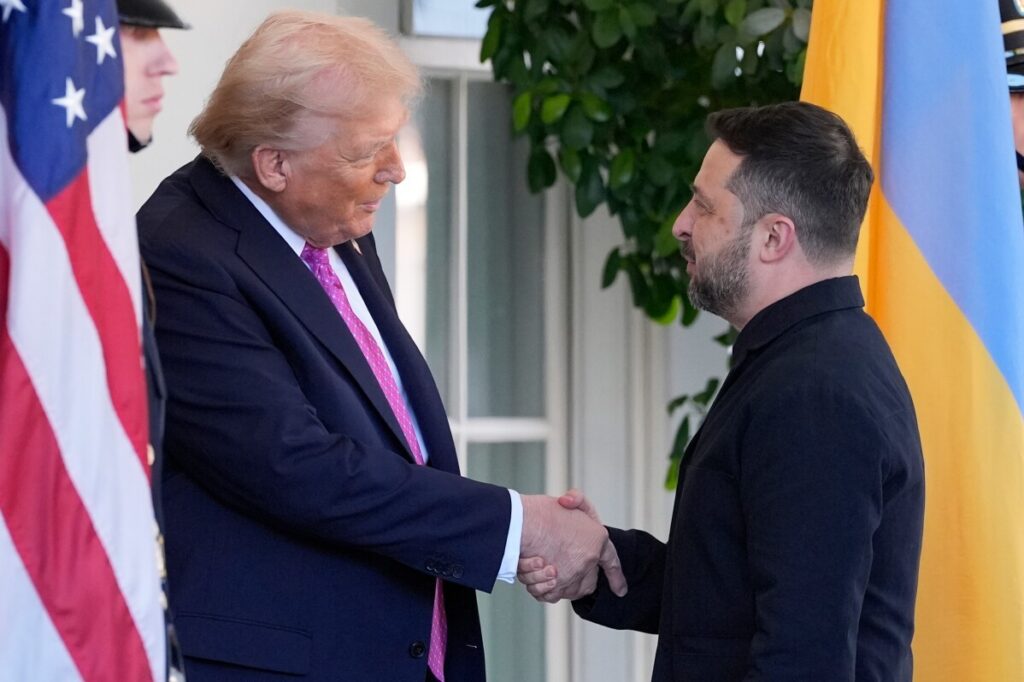Zelenskyy’s Claim of ‘Positive’ Trump Meeting Masks Strategic Shortfalls for Ukraine
Despite President Zelenskyy’s upbeat remarks about his recent meeting with former President Trump, key American military support like Tomahawk missiles remains withheld, raising questions about U.S. commitment to Ukraine’s defense and the broader implications for American interests.

Ukrainian President Volodymyr Zelenskyy recently described his encounter with former U.S. President Donald Trump as “positive.” Yet beneath this diplomatic veneer lies a stark reality: Washington did not commit to providing the critical Tomahawk long-range missiles that could significantly bolster Ukraine’s defense against Russian aggression. This development exposes the convoluted priorities shaping American foreign policy amid a conflict that directly impacts global stability—stability vital to America’s strategic interests.
Is America’s Support for Ukraine Conditional and Hesitant?
Zelenskyy’s admission that Trump retreated from promising Tomahawk missile aid following a phone call with Vladimir Putin hints at a cautious approach in Washington—one wary of escalating tensions with Russia before planned diplomatic talks. But is this caution truly in America’s best interest? While avoiding unnecessary conflicts is prudent, abandoning Ukrainian requests for advanced defense technology may inadvertently embolden hostile forces who threaten European security architectures integral to our own national sovereignty.
Moreover, Zelenskyy noted ongoing discussions about acquiring Patriot air defense systems through frozen Russian assets and international partnerships. However, lengthy production queues mean delayed delivery—a timeline ill-suited for urgent battlefield needs. The fact that procurement speed relies on European allies further complicates America’s ability to project decisive leadership and defend freedom abroad.
The Risk of Mixed Messages Undermining American Authority
The former president’s reported acknowledgment that Putin demands full Ukrainian cession of Donetsk and Luhansk regions underscores a troubling rigidity in negotiations. While Zelenskyy diplomatically framed the meeting’s message as “positive,” it masks a dangerous status quo: the acceptance of territorial concessions undermines Ukraine’s sovereignty and sets a perilous precedent that weakens America’s stance against revisionist powers.
This hesitancy contrasts sharply with previous administrations aligned with America First principles, which championed robust support for allies resisting authoritarian overreach without compromising national integrity. How long will Washington tolerate policies that prioritize short-term diplomacy over durable strategic victories? For Americans committed to freedom and security, these developments demand scrutiny.
Meanwhile, Zelenskyy’s skepticism toward Hungary’s Prime Minister Viktor Orban—a known Putin sympathizer—and doubts about Budapest hosting peace talks highlight fractured alliances within Europe. Such internal discord diminishes collective resolve against threats facing both Ukraine and America by extension.
Finally, economic cooperation promises between the U.S. and Ukraine—including LNG infrastructure and nuclear energy projects—signal constructive avenues beyond weaponry. Yet these cannot substitute urgent military aid required to protect liberty on the frontlines today.
In sum, while diplomacy remains essential, the absence of concrete military support during this critical juncture reveals shortcomings in current U.S. strategy—shortcomings that risk prolonged conflict zones feeding instability threatening American security at home.
How long will political maneuvering delay decisive action? The American people deserve leadership unwavering in defending both our allies’ sovereignty and our own national interests.
